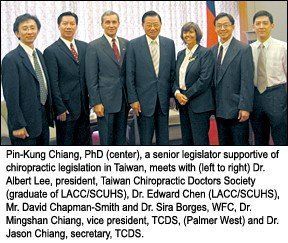It’s a new year and many chiropractors are evaluating what will enhance their respective practices, particularly as it relates to their bottom line. One of the most common questions I get is: “Do I need to be credentialed to bill insurance, and what are the best plans to join?” It’s a loaded question – but one every DC ponders. Whether you're already in-network or pondering whether to join, here's what you need to know.
WFC Successes - What They Mean for You
We represent the ICA and the ACA on the World Federation of Chiropractic (WFC) Council, and would like to report on some of the exciting activities and achievements of the WFC and its members in recent months. These developments may be occurring outside the United States, but they impact the future for all of us in our global village, our interconnected modern world. The WFC now represents 86 national associations of chiropractors, the most recent country members being Botswana and India, and has the resources and experience to accelerate the growth and acceptance of chiropractic worldwide as never before.
Let's start with Brazil, a large and influential country with 150 million people, but which had only three doctors of chiropractic in 1990. They formed an association, the Asociacao Brasileira de Quiropraxia (ABQ), in order to join the WFC and gain support for the development of chiropractic in Brazil.
Through the partnership of the ABQ and the WFC, two university-based chiropractic schools have been established, one supported by Palmer College and the other by Western States. These schools now have a total of approximately 700 students, and first graduates have swelled the number of ABQ members from three to 125.
And recently, in April 2006, the Brazilian Ministry of Education and Culture accredited both programs and recognized their degrees in chiropractic. This is in a country where there are no chiropractic laws and physical therapists have been trying to establish chiropractic as a specialty in their discipline. Chiropractic now has a sure future in Brazil. Congratulations to the ABQ leaders, especially ABQ President Dr Ricardo Fujikawa of Sao Paulo, a Palmer graduate who represents the Latin American region on the WFC Council.
A related WFC achievement that is helping chiropractic leaders in many countries without laws who are fighting pseudo-chiropractors, including those in Brazil, is its strong partnership with the World Health Organization (WHO), which has just produced its Guidelines on Basic Training and Safety in Chiropractic. The WHO Guidelines can be found at www.wfc.org and www.who.int.
The first iteration of the WHO Guidelines would have been very unacceptable to the profession, but through a period of concerted effort by the WFC, major improvements were brought to the WHO effort.

That being said, we are not pleased with the exact title chosen by the WHO, but the WFC is comfortable, as you will be when you read them, with the guidelines and their content. They advise the 183 member nations of WHO worldwide that chiropractic health care is a potentially important part of any health care system, but that only qualified chiropractors should be able to provide chiropractic services. "Commercial exploitation" of chiropractic education and practice, for example, in short technique courses for other professionals, should not be allowed.
The important point is that the WHO is saying these things strongly supportive of chiropractic, not the profession itself. The WFC worked long and hard with the WHO over a period of five years to achieve this result. Particular thanks are due to WFC Past President, Dr. John Sweaney of Australia, who the WHO employed as its main consultant. These guidelines will be valuable for years to come. They are presently being published in English, Finnish, French, German, Japanese, Korean, Portuguese and Spanish.

We could go on - but we would like to give just a few more examples of the work of the WFC. First, in Asia, the two countries still prosecuting chiropractors and threatening them with imprisonment are South Korea and Taiwan. The WFC sent a delegation, led by WFC Secretary General, Mr. David Chapman-Smith, to these countries last November. The delegation supported the Korean Chiropractors' Association (KCA) and the Taiwan Chiropractic Doctors' Society (TCDS) in meetings with ministers of health and many other senior government figures, a presentation on chiropractic at the Korean National Assembly, as well as press conferences and media presentations.
The WFC then encouraged support from American organizations, given the respect that South Korea and Taiwan have for the United States. This came, for example, from the American Chiropractic Association, the Association of Chiropractic Colleges and the American Chinese Chiropractors Association, led by Taiwanese national Dr. John Hsieh of Los Angeles. This united effort, led of course by the brave and dedicated members of the KCA and TCDS themselves, has had the historic result that legislative bills to recognize and regulate chiropractic practice are now before the parliaments in both Korea and Taiwan.
As another example, from May 12-13, the WFC held a complimentary technique seminar (by a leading instructor, Dr. Tom Bergmann) and legislative workshop in Cyprus for its member countries and DCs in the Eastern Mediterranean Region. It was attended by chiropractors from countries such as Cyprus, Eygpt, Iran, Lebanon, Qatar, Saudi Arabia, Turkey, and the United Arab Emirates (UAE). It was arranged by the WFC council member for the region, Palmer graduate Dr. Stathis Papadopoulos of Cyprus.

This was to promote better organization and development of the profession in a region where chiropractors are isolated, with only 5-12 per country, and where too few countries formally recognize chiropractic. Exceptions, with good laws that the WFC hopes will serve as a model for other countries, are Cyprus, Iran and the UAE.
From May 22-26, a 14-person delegation from the WFC, led by Dr. Clum as the WFC first vice-president, Mr. David Chapman Smith as secretary-general, and Dr Frank Zolli, president, Association of Chiropractic Colleges, attended the annual meeting of the World Health Organization, the World Health Assembly (WHA), in Geneva, Switzerland to meet with representatives of governments around the world with respect to the role chiropractic care can play in their respective countries. Through efforts such as this, the WFC helps to give a face and voice to the profession at the most senior levels of health administration around the globe.
Why don't you join us in this exciting adventure to establish chiropractic worldwide on the basis of its traditional philosophy, educational standards and identity? There are two things you can do right away:
- Join as an associate member, getting regular news of developments such as those discussed in this article. The cost is only $180. The application form is available at www.wfc.org. For more information, contact Serena Smith, 202/1246 Yonge Street, Toronto, Ontario, Canada, M4T 1W5; tel: (416) 484-9978; fax: (416) 484-9665, e-mail: ssmith@wfc.org.
- Plan to be at the WFC's 9th Biennial Congress in Vilamoura, Portugal, May 17-19, 2007. Feel the energy and excitement of the WFC at this beach and golfing resort on the Algarve, Portugal's famous southern coast. All details of this fine program are available online at www.wfc.org/congress2007.



